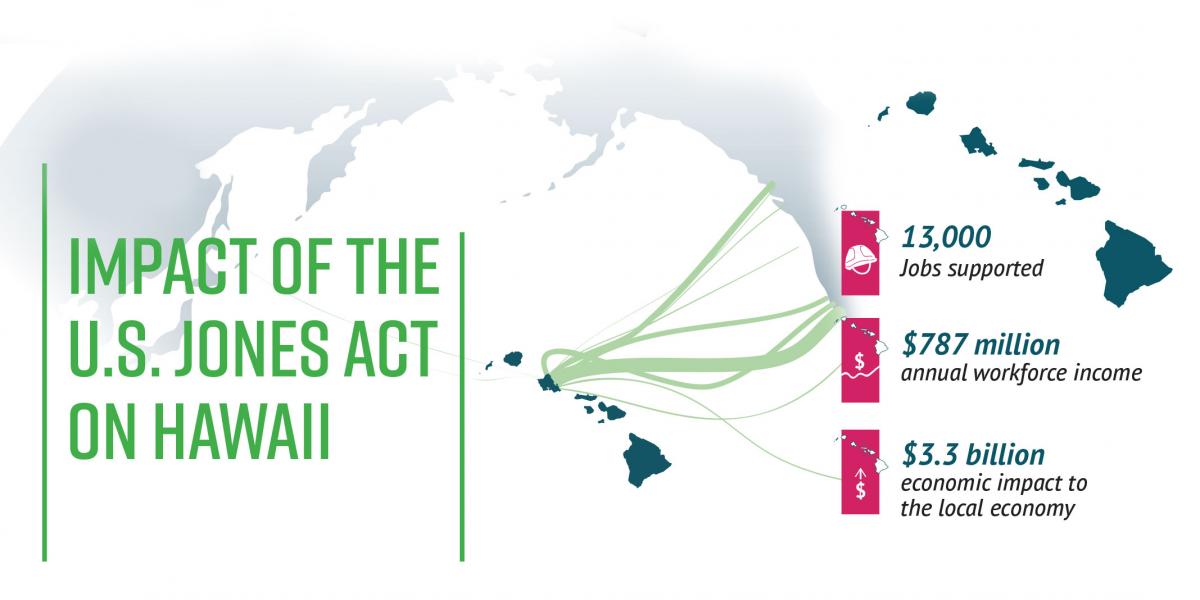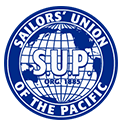... where mercy walks a plank," sung Bob Dylan. The U.S. merchant marine exists by force of law. Without the ongoing support of our complex political system good Union jobs could be swept away. It takes continuous effort to hold our elected representatives accountable, continuous work to call out the attacks on the Jones Act. Cargo preference and the Maritime Security Program are routinely targeted by this or that special interest, and despite the integral essential nature of our work to the supply chain and to the U.S. military, there is none that will look out for us, none but ourselves to hold the line. Political action is made of this work -- to defend and gain, to educate and inform, to reward our friends and punish our enemies.
May 17, 2023
TTD: OCEAN SHIPPING REFORMS SHOULD NOT UNDERCUT WORKERS
In March, federal lawmakers introduced the Ocean Shipping Antitrust Enforcement Act of 2023 (H.R. 1696) to repeal the limited antitrust immunity afforded to foreign ocean carriers and dissolve the three major foreign shipping company alliances. This would have serious unintended consequences for dockworkers and other maritime workers that service these foreign ocean carriers at U.S. ports.
Therefore, we oppose the Ocean Shipping Antitrust Enforcement Act of 2023, H.R. 1696, and urge lawmakers to consider the adverse impact that this legislation would have on U.S. maritime workers.
Background on Proposed Legislation & The Shipping Industry
By introducing the Ocean Shipping Antitrust Enforcement Act of 2023, lawmakers are doubling down on last year’s failed efforts to overturn more than 100 years of limited antitrust immunity for shipping companies. Since the passage of the Shipping Act of 1916, ocean carriers have enjoyed limited antitrust immunity with respect to agreements concerning shipping rates, vessel sharing, and shipping route allocations, so long as those agreements are first submitted to and approved by the Federal Maritime Commission (FMC), which oversees and regulates industry conduct.
Eliminating this limited antitrust immunity would undermine the ocean carriers’ ability to form vessel sharing agreements, which enable carriers to share space on one another’s ships. For example, vessel sharing agreements allow Maersk and MSC to transport each other’s cargo aboard their respective vessels, while CMA CGM, COSCO, Evergreen, and OOCL can all transport each other’s cargo. Shared vessel space benefits both carriers and shippers by ensuring that vessels sail as full as possible, providing customers with more frequent service at more ports at a lower cost.
Effects on Maritime Labor
While ocean carriers are usually not the common law employers of longshore workers, the National Labor Relations Board (NLRB) and federal courts have historically recognized that ocean carriers nonetheless qualify as longshore employers under national labor law. These carriers are members of coastwise multiemployer bargaining associations that negotiate and administer longshore collective bargaining agreements. By operation, this confers employer status on ocean carriers, even though they do not directly employ workers who service their vessels.
In addition, many dockworkers who work at small to medium-sized ports will suffer a decrease in man hours due to the elimination of vessel sharing agreements, as carriers will likely concentrate their services at larger ports because demand in these regions is higher and, in turn, vessel space can be filled more quickly. As a result of fewer sailings to smaller and medium-sized ports, there will be less consistent work at these ports, and a significant percentage of dockworkers will likely experience a decrease in work opportunity.
We stand in solidarity with the ILA and all other maritime labor in opposing the passage of H.R. 1696 and urge lawmakers to consider the adverse impact that this legislation will have on maritime workers.
TTD Policy Statement No. S23-05
Adopted May 17, 2023
REDEFINING AN INDUSTRY: UPDATED EDUCATION POLICIES CAN STRENGTHEN THE U.S. MARITIME WORKFORCE
The United States is experiencing an acute shortage of professional mariners indispensable to U.S. national security, economic security, and humanitarian response efforts as a global peace leader. In 2017, the U.S. Maritime Administration found that the United States is approximately 1,800 mariners short of what is sufficient to mobilize a drawn-out military effort exceeding 4-6 months. Today, that number is much higher. With the war in Ukraine entering its second year and escalating U.S.-China tensions, the shortage of U.S. Merchant Mariners threatens U.S. national security. In a post-COVID-19 pandemic recovery, a whole-of-government approach is necessary to address significant maritime industry workforce concerns in recruitment and retention.
We call on Congress and the Biden Administration to implement aggressive strategies to resolve the mariner workforce gap by increasing enrollment at maritime academies and other maritime training institutions by breaking down financial barriers to entering the industry. Congress and the Biden Administration should increase student incentive payments for mariner education and training; subsidize expenses for academies and schools so costs are not shifted to the pockets of cadets and other entry-level mariners; and allow licensed and unlicensed merchant mariners to receive student loan forgiveness when they enter the workforce.
In times of peace, Merchant Mariners work on commercial vessels, transporting imports and exports by sea. In times of war, these same highly skilled civilian merchant mariners are called into service by the Department of Defense to move troops and materials on U.S.-flag commercial vessels and government owned vessels. Most of the skilled maritime officers working aboard these vessels are graduates of the federal U.S. Merchant Marine Academy (USMMA) or from one of the State Maritime Academies. Officers who graduate from USMMA commit to serving our country as licensed Merchant Marine Officers and commissioned officers in the Armed Forces for a minimum of five years. In addition to USMMA, the six additional State Maritime Academies are located in California, Michigan, Maine, Massachusetts, New York, and Texas provide cadets with the at-sea training necessary to become a licensed merchant marine officer.
Increase Student Incentive Payments to Attract Prospective Students
The Strategic Sealift Midshipman Program is an education and training program conducted by the Department of Naval Science at the USMMA and six State Maritime Academies. Cadets who enroll in this program can receive Student Incentive Payments of up to $32,000 ($8,000 per school year) while at the State Maritime Academies. In doing so, cadets must maintain their license for six years, sail on their license for three years, and maintain their commission in the U.S. Navy Reserve as Strategic Sealift Officers. We call on Congress to increase the maximum Student Incentive Payments from $32,000 to $64,00 to increase interest in the Strategic Sealift Midshipman Program amongst cadets attending state maritime academies and increase the number of graduates who have an obligation to sail on their license for a minimum of three years after graduation.
Increase Fuel Funding for Training Ships to Lower Attendance Costs for Cadets
Cadets attending Maritime Academies must complete Sea Year training to give cadets practical knowledge of the performance and operating characteristics of various vessels and operating requirements in different trade routes. It also enables cadets to obtain the at-sea training days necessary to become eligible for a U.S. Coast Guard merchant officer license examination. Sea Year training usually occurs during a cadet’s sophomore year, followed by a more extended sailing period in their junior year.
Unfortunately, Sea Year Training is very costly; vessel fueling is the primary cost. To increase enrollment in Sea Year training and grow the pool of professional mariners, Congress should provide fuel subsidies for training vessels operated by State Maritime Academies. Fuel subsidies should also be provided for State Maritime Academy-owned and leased vessels that provide cadets with the option of obtaining the Dedicated Duty Engineer and Mate of Towing license endorsements.
Allow U.S. Merchant Mariners to be eligible for Loan Forgiveness
The Public Service Loan Forgiveness program encourages individuals to enter and continue full-time public service employment by forgiving their remaining balance after completing specific public service and loan payment requirements. Qualifying employment includes the U.S. military and government organizations at the federal, state, local, or tribal level. The Maritime Administration relies on the U.S. Merchant Marine to crew the National Defense Reserve Fleet and Ready Reserve Fleet for civil maritime transportation support to military mobilizations and respond to national emergencies. U.S. Merchant Mariners sailing on board U.S. flagged vessels at least 180 days per year should be eligible for Public Service Loan Forgiveness as they are critical to national and economic security.
Supporting Recruitment of Unlicensed Mariners and Union Schools
Professional mariners who are not officers, also known as ratings, or unlicensed mariners, are just as important, uniquely qualified, and in high demand as licensed mariners. They also face financial barriers and prohibitive entry-level expense loads. Many become members of maritime unions and are supported by union training funds and schools. Yet even with that support, some costs threaten their continuing certification and credentialing.
Congress should also allow unlicensed mariners to be eligible for grant funding and forgivable loans that offset the initial financial outlays required of persons new to the maritime trades. This would serve as a recruitment aid to the good jobs in the offshore sector necessary to national security. Union schools and training programs should likewise be eligible for federal grants to schools that not only provide the training but also attach that training to the jobs that produce commitment and retention to bolster the nation’s sealift readiness.
Beyond training, there should be funding for educational materials and trained advisors to counsel existing mariners on gaining seagoing credentials. Helping inland mariners make the transition to a different set of requirements for offshore seagoing work, for example, or aiding veterans in re-employment at sea, are fertile areas for the growth and development of this vital workforce. There should also be support for U.S. regulatory adaptation such as that proposed by the Merchant Marine Personnel Advisory Committee to recognize and meet world standards on the sea time required for upgrades from entry-level ratings to Able Seafarer/Deck and Able Seafarer/Engine, making it easier to achieve the qualifications necessary for a sustainable job.
Throughout history, U.S. Merchant Mariners have played a central role in America’s economic growth, military preparedness, national security, and disaster relief efforts. Recently, pandemic supply chain issues have demonstrated how crucial it is for the United States to have a qualified mariner pool in order to become more self-reliant in transporting commercial goods, energy production, and cargo transportation. In addition to supporting mariner recruitment efforts, Congress and the Administration must continue to support fundamental legislation like the Jones Act, Cargo Preference laws, and the Maritime Security Program. Strong support for these vital laws and implementing policies that support mariner education will grow the U.S. mariner pool and uplift the U.S. Maritime Industry.
TTD Policy Statement No. S23-04
Adopted May 17, 2023
Election Season is on!
The Sailors' Union of the Pacific supports only those candidates that honor Union labor, that work for the interests of SUP members, and that support the U.S. Merchant Marine.
State Federation of Labor has also developed a useful tool that allows endorsement research by area or county. Access it HERE.
U.S. REPRESENTATIVES IN CONGRESS
Congressional District 1 Max Steiner (D)
Congressional District 2 Jared Huffman (D)
Congressional District 3 Kermit Jones (D)
Congressional District 4 Mike Thompson (D)
Congressional District 5 Mike Barkley (D)
Congressional District 6 Ami Bera (D)
Congressional District 7 Doris Matsui (D)
Congressional District 8 John Garamendi (D)
Congressional District 9 Josh Harder (D)
Congressional District 10 Mark DeSaulnier (D)
Congressional District 11 Nancy Pelosi (D)
Congressional District 12 Barbara Lee (D)
Congressional District 13 No Recommendation
Congressional District 14 Eric Swalwell (D)
Congressional District 15 Kevin Mullin (D)
Congressional District 16 Anna Eshoo (D)
Congressional District 17 Ro Khanna (D)
Congressional District 18 Zoe Lofgren (D)
Congressional District 19 Jimmy Panetta (D)
Congressional District 20 Marisa Wood (D)
Congressional District 22 Rudy Salas (D)
Congressional District 23 Derek Marshall (D)
Congressional District 24 Salud Carbajal
Congressional District 25 No Recommendation
Congressional District 26 Julia Brownley (D)
Congressional District 27 Christy Smith (D)
Congressional District 28 Judy Chu(D)
Congressional District 29 Tony Cardenas (D)
Congressional District 30 Adam Schiff (D)
Congressional District 31 Grace Napolitano (D)
Congressional District 32 Brad Sherman (D)
Congressional District 33 Pete Aguilar (D)
Congressional District 34 Jimmy Gomez (D)
Congressional District 35 No Recommendation
Congressional District 36 Ted Lieu (D)
Congressional District 37 Sydney Kamlager (D)
Congressional District 38 Linda Sanchez (D)
Congressional District 39 Mark Takano (D)
Congressional District 40 Asif Mahmood (D)
Congressional District 41 Will Rollins (D)
Congressional District 42 Robert Garcia
Congressional District 43 Maxine Waters (D)
Congressional District 44 Nanette Barragan (D)
Congressional District 45 Jay Chen (D)
Congressional District 46 Lou Correa (D)
Congressional District 47 Katie Porter (D)
Congressional District 48 No Endorsement
Congressional District 49 Mike Levin (D)
Congressional District 50 Refer to Executive Council
Congressional District 51 Sara Jacobs (D)
Congressional District 52 Juan Vargas (D)
California State Senate
Senate District 2 Mike McGuire (D)
Senate District 4 Tim Robertson (D)
Senate District 6 Paula Villescaz (D)
Senate District 8 Dave Jones
Senate District 10 Aisha Wahab (D)
Senate District 12 No Endorsement
Senate District 14 Anna Caballero (D)
Senate District 16 OPEN
Senate District 18 Steve Padilla (D)
Senate District 20 Daniel Hertzberg (D)
Senate District 22 No Recommendation
Senate District 24 Ben Allen (D)
Senate District 26 Maria Elena Durazo (D)
Senate District 28 Lola Smallwood Cuevas (D)
Senate District 30 Bob Archuleta (D)
Senate District 32 No Endorsement
Senate District 34 Tom Umberg (D)
Senate District 36 Kim Carr (D)
Senate District 38 Catherine Blakespear (D)
Senate District 40 Joseph Rocha (D)
California State Assembly
Assembly District 1 Refer to Executive Council
Assembly District 2 Jim Wood (D)
Assembly District 3 No Endorsement
Assembly District 4 Cecelia Aguiar-Curry (D)
Assembly District 5 No Endorsement
Assembly District 6 Kevin McCarty (D)
Assembly District 7 No Endorsement
Assembly District 8 No Endorsement
Assembly District 9 Heath Flora (R)
Assembly District 10 Eric Guerra (D)
Assembly District 11 Lori Wilson (D)
Assembly District 12 Damon Connolly (D)
Assembly District 13 Carlos Villapudua (D)
Assembly District 14 Buffy Wicks (D)
Assembly District 15 Tim Grayson (D)
Assembly District 16 Rebecca Bauer-Kahan (D)
Assembly District 17 OPEN (D)
Assembly District 18 Mia Bonta (D)
Assembly District 19 Phil Ting (D)
Assembly District 20 Liz Ortega (D)
Assembly District 21 No Recommendation
Assembly District 22 Jessica Self (D)
Assembly District 23 Marc Berman
Assembly District 24 Alex Lee (D)
Assembly District 25 Ash Kalra (D)
Assembly District 26 Evan Low (D)
Assembly District 27 Esmeralda Soria (D)
Assembly District 28 DUAL: Gail Pellerin (D)/ Rob Rennie (D)
Assembly District 29 Robert Rivas (D)
Assembly District 30 DUAL: Dawn Addis (D)/ Jon Wizard (D)
Assembly District 31 Joaquin Arambula (D)
Assembly District 32 No Endorsement
Assembly District 33 Joe Sigala (D)
Assembly District 34 No Recommendation
Assembly District 35 Leticia Perez (D)
Assembly District 36 Eduardo Garcia (D)
Assembly District 37 Gregg Hart (D)
Assembly District 38 Steve Bennett
Assembly District 39 Andrea Rosenthal (D)
Assembly District 40 Pilar Schiavo (D)
Assembly District 41 Chris Holden (D)
Assembly District 42 Jacqui Irwin (D)
Assembly District 43 Luz Rivas (D)
Assembly District 44 Laura Friedman (D)
Assembly District 45 James Ramos (D)
Assembly District 46 Jesse Gabriel (D)
Assembly District 47 Christy Holstege (D)
Assembly District 48 No Recommendation
Assembly District 49 Mike Fong (D)
Assembly District 50 Eloise Gomez-Reyes (D)
Assembly District 51 Rick Chavez-Zbur (D)
Assembly District 52 Wendy Carrillo (D)
Assembly District 53 Refer to Executive Council
Assembly District 54 Miguel Santiago (D)
Assembly District 55 Isaac Bryan (D)
Assembly District 56 Lisa Calderon (D)
Assembly District 57 Reggie Jones-Sawyer (D)
Assembly District 58 Sabrina Cervantes (D)
Assembly District 59 No Endorsement
Assembly District 60 No Recommendation
Assembly District 61 Tina McKinnor (D)
Assembly District 62 Anthony Rendon (D)
Assembly District 63 Fauzia Rizvi (D)
Assembly District 64 Elizabeth Alcantar-Loza (D)
Assembly District 65 Mike Gipson (D)
Assembly District 66 No Recommendation
Assembly District 67 Sharon Quirk-Silva (D)
Assembly District 68 Avelino Valencia (D)
Assembly District 69 Josh Lowenthal (D)
Assembly District 70 Diedre Thu-Ha Nguyen (D)
Assembly District 71 No Recommendation
Assembly District 72 No Recommendation
Assembly District 73 Cottie Petrie-Norris (D)
Assembly District 74 Chris Duncan (D)
Assembly District 75 No Endorsement
Assembly District 76 Brian Maienschein (D)
Assembly District 77 Tasha Boerner Horvath (D)
Assembly District 78 Chris Ward (D)
Assembly District 79 No Recommendation
Assembly District 80 Georgette Gomez (D)
Board of Equalization
District 1 No Recommendation
District 2 DUAL: Michaela Alioto-Pier (D)/ Sally Lieber (D)
District 3 Tony Vasquez (D)
District 4 No Recommendation
United States Senate
U.S. Senate Alex Padilla (D)
State Constitutional Offices
Superintendent of Public Instruction: Tony Thurmond
Insurance Commissioner: Ricardo Lara (D)
Treasurer: Fiona Ma (D)
Controller: Malia Cohen (D)
Attorney General: Rob Bonta (D)
Secretary of State: Shirley Weber (D)
Lieutenant Governor: Eleni Kounalakis (D)
Governor: Gavin Newsom (D)
Alameda Labor Council, AFL-CIO 2022 June Primary Endorsements
State Offices
Aisha Wahab, State Senate District 10
Buffy Wicks, State Assembly District 14
Rebecca Bauer-Kahan, Assembly District 16
Mia Bonta, State Assembly District 18
Liz Ortega, State Assembly District 20
Alex Lee, State Assembly District 24
Gavin Newsom, Governor
Eleni Kounalakis, Lieutenant Governor
Malia Cohen, State Controller
Shirley Weber, Secretary of State
Rob Bonta, Attorney General
Tony Thurmond, Superintendent of Public Instruction
Ricardo Lara, Insurance Commissioner
Fiona Ma, Treasurer
Federal
Mark DeSaulnier, Congressional District 10
Barbara Lee, Congressional District 12
Eric Swalwell, Congressional District 14
Ro Khanna, Congressional District 17
Alex Padilla, U.S. Senate
Measures
YES on Measure B (Alameda USD Bond)
Happy Birthday to the Jones Act!
The Merchant Marine Act of 1920, and its critical Section 27, commonly known as the Jones Act, turns 100 in June of 2020. This venerable law has withstood countless attacks and the test of time.
The Merchant Marine Act of 1920 is a United States federal statute that provides for the promotion and maintenance of the American merchant marine. Among other purposes, the law regulates maritime commerce in U.S. waters and between U.S. ports. Section 27 of the Merchant Marine Act is known as the Jones Act and deals with cabotage and requires that all goods transported by water between U.S. ports be carried on U.S.-flag ships, constructed in the United States, owned by U.S. citizens, and crewed by U.S. citizens and U.S. permanent residents. The act was introduced by Senator Wesley Jones. The law also defines certain seaman's rights.
The Jones Act comes under routine attack for a variety of reasons but chief among them is the putative cost increase associated with maritime cabotage. Leaving aside the many other reasons to have a Jones Act, (reasons that every developed nation in the world has found convincing enough to ensure passage of their own versions,) the higher costs argument, on absolute terms as well as in terms of return on investment, has been debunked over and over.
A recent study focused on the effect of the Jones Act with specific focus on the Hawaiian economy found results that are beneficial for both the state and the nation.
The Jones Act is critical to American security and prosperity, delivering over 650,000 U.S. jobs, a reliable supply chain, and protection to our nation’s borders and national security interests. These benefits do not stop within the contiguous United States – and are realized even more in states like Hawaii, 2,500 miles from the U.S. Mainland and home to 13,000 jobs related to the Jones Act shipping industry.
However, a number of recent studies and articles have questioned the value of the Jones Act to Hawaii. Their claims of negative impact are not supported by the facts and ignore the examples of the positive role of the Jones Act. In response, Reeve & Associates and TZ Economics produced a fact-based analysis of recent developments in the U.S. Mainland/Hawaii liner shipping market in order to determine how and to what extent shipping services provided in that market impact the people and economy of Hawaii, and, in particular, the cost of living in Hawaii.
Findings demonstrate a negligible impact of Jones Act carriers’ ocean shipping services on the price of goods shipped to Hawaii from the U.S. Mainland, and instead illustrate positive economic contributions, including job creation, new infrastructure investments, and a reliable pipeline for critical consumer and industrial goods moving to and from the Islands.
The full study is here: The Jones Act and Hawaii -- 2020


Read more about the Jones Act on our Jones Act page under this same Political tab or click here.
Martime Trades Department, AFL-CIO
The SUP is a founding member of the Martime Trades Department of the AFL-CIO. It is one of only a few coalitions within the one of the largest federations of Unions in the world, known as the AFL-CIO.
The MTD supports maritime workers across a broad range of issues and has dones so for a very long time. The MTD and the labor movement in general have strongly supported of the Jones Act. Here is the official position:
"Despite its nearly century-long record of success, the Jones Act – America’s freight cabotage law – continues to be targeted by detractors as a measure that needs either to be weakened or altogether eliminated.
Cabotage laws have been the norm since the early days of our nation. The first Congress of the United States in 1789 restricted registration for coastal trades and fisheries to U.S.-built and U.S.-owned vessels and gave these vessels preferential treatment with respect to tonnage taxes and cargo import duties. Additional cabotage laws designed to fend off foreign operators were legislated during the years between that first cabotage law and the passage of the Jones Act over a century later.
Enacted in 1920 in response to America’s lack of preparedness for World War I, the Jones Act requires that cargo moving between U.S. domestic ports be carried on vessels that are crewed, built, owned and flagged American. It calls for providing the nation with a merchant marine that can transport goods between U.S. ports, increase national security during war times, and support a U.S. maritime industry. The measure’s sponsor, Senator Wesley Jones of Washington, declared, “Nations are not free that depend on foreign fleets to carry their products and bring them their supplies.”
Since its inception, the Jones Act has always enjoyed widespread support. Among its backers are legislators from both sides of the aisle; U.S. military leaders; non-partisan, non-profit think tanks; a number of well-respected journalists; published researchers; and every White House no matter the party. Without exception, Jones Act supporters concur that the law is critical to the national, economic and homeland security needs of the United States; its value has been proven time and again.
According to the American Maritime Partnership coalition, whose member organizations include MTD affiliates, the measure since its origin has:
- Made sure that 70 percent of the oceangoing self-propelled vessels in the Jones Act fleet are militarily useful, which is of vital importance as 95 percent of materiel used by forces overseas moves by water;
- Moved an average of 1 billion tons worth of cargo every year with a market value of $400 billion;
- Pumped $29 billion in annual wages into the American economy;
- Sustained nearly 500,000 jobs directly and indirectly;
- Added $46 billion to the value of U.S. economic output each year;
- Produced $11 billion in taxes annually; and
- Maintained a pool of skilled civilian mariners capable of meeting the nation’s strategic sealift needs.
Regardless of its merit, the Jones Act regularly comes under fire from those who either truly don’t understand it or whose agendas don’t include preserving the U.S. Merchant Marine.
A notable example occurred in 2010 during the aftermath of the Deepwater Horizon disaster. On that occasion, the Jones Act and the Obama Administration were targets of drastically inaccurate criticism by some media outlets and elected representatives who falsely claimed that the Jones Act was impeding cleanup operations following the fatal explosion, which also resulted in a cataclysmic oil spill.
The administration and then-national incident response commander, U.S. Coast Guard Admiral Thad Allen, refuted those false claims, and the official government report on the spill response later confirmed that the Jones Act in no way slowed the cleanup. The facts are that the Jones Act did not apply where the spill occurred (50 miles from the U.S.), and foreign-flag assistance was utilized (along with U.S.-flag tonnage) essentially from the start. Further, the administration quickly set up an expedited Jones Act-waiver process in case any were needed for related operations closer to shore.
More recently, critics wrongly claimed the Jones Act hampered relief efforts in Puerto Rico in the wake of Hurricane Maria. Even though nothing could have been further from the truth, Jones Act opponents used their flawed accusations as a foundation to call for weakening or eliminating the law. It was of little consequence to them that the backdrop for their claims showed stacks and stacks of containers delivered to the Port of San Juan by U.S.-flag vessels. They willingly neglected the fact that Jones Act ships were offloading in Puerto Rico within hours after the first port reopened and that these vessels continue to deliver vital cargoes even today. They completely overlooked the fact that because of damaged roads and numerous other infrastructure problems, significant portions of the waterborne cargo initially stayed in the ports. They coasted right past the fact that none of these circumstances had anything to do with any maritime law.
Succinctly put, virtually every statement put forth in each of the former situations as justification to weaken or kill the Jones Act was a lie; once again, the Jones Act was falsely accused.
For these and other reasons, the MTD, its affiliates and its Port Maritime Councils must remain resolutely committed to doing everything in our power to ensure that the integrity of the Jones Act remains firmly intact.
The MTD once again vows to continue its work with its affiliates, its Port Maritime Councils and grassroots organizations like the American Maritime Partnership to promote and protect the Jones Act in every possible way, including by educating elected officials and the American public about the critical magnitude and irreplaceable value of the Jones Act."
Approved 2018 MTD Executive Board Meeting
Check in with the Maritime Trades Department, AFL-CIO
Jones Act Support -- Maritime Trades Department, AFL-CIO
Another common accusation against the Jones Act is that it drives up costs. Relative to what? To bottom-feeding flag-of-convenience shipowners?
Study after study has shown that America gets excellent, secure, and reliable service from its Jones Act trade.
The SUP is also a member of the 33 Unions that make up the Transportation Trades Department of the AFL-CIO. The TTD is also a bold voice for all transportation labor. It routinely advocates on behalf of workers in Washington DC, taking on the full portfolio of labor's transporation agenda including the Jones Act, the Maritime Security Program and cargo preference.
The San Francisco Port Council of the Maritime Trades Department on May 11, 2022 adopted the following resolution opposing cargo preference waivers in general and specifically related to Ukrained relief supplemental bill:
RESOLUTION
IN SUPPORT OF
SHIP AMERICAN CARGO PREFERENCE RULES
SAN FRANCISCO PORTS COUNCIL
MARITIME TRADES DEPARTMENT
AFL-CIO
WHEREAS, the San Francisco Ports Council of the Maritime Trades Department, AFL-CIO has steadfastly fought to improve the wages, working conditions of U.S. maritime workers and to maintain the legal foundations that support the U.S. Merchant Marine as a source of working-class jobs, good benefits, and more broadly the economic prosperity and security of the nation, and;
WHEREAS, chief among these legal foundations is the Jones Act, the Maritime Security Program, and the Ship American or cargo preference rules, which together form a maritime cabotage system that is the envy of the world, and;
WHEREAS, the U.S. Senate is now considering amendments to the second Ukrainian supplemental aid bill, a small part of which in Concurrent Resolutions 37 and 38 authored by Senators Joni Ernst and Chris Coons) would broadly waive the cargo preference requirements of worldwide food relief available under America’s Food for Peace Program (PL-480), and;
WHEREAS, the cargo preference waivers are unnecessary since waivers are already available within existing law, and;
WHEREAS, the waivers overly broad as crafted to apply to all markets not just the Ukraine affected markets, as well as open-ended since there is either an arbitrary indefinite or three-year of applicability, and;
WHEREAS, the cargo preference waivers will allow foreign-flag, foreign-crewed ships to move U.S. taxpayer funded cargo to the diminishment and detriment of U.S. shipping and U.S. sailors which is to betray an industry and a workforce that existed from the outset of the nation, and;
NOW, THEREFORE, BE IT RESOLVED that the San Francisco Maritime Trades Ports Council herewith opposes Senate Concurrent Resolutions 37 and 38 in the Ukrainian supplemental funding legislation and any subversion of U.S. cargo preference law, and;
BE IT FURTHER RESOLVED, that the Council calls instead for a Congressional affirmation of the nation’s Merchant Marine and the underlying cabotage laws that connect American prosperity and charity programs with good jobs for American mariners and maritime workers, and;
BE IT FINALLY RESOLVED, that the Council will communicate this message to MTD Headquarters, to other Port Councils, the U.S. House of Representatives, and the U.S. Senate and in particular the California Senators Diane Feinstein and Alex Padilla.
Transportation Trades Department AFL-CIO
Political Action Tool Kit
| TRACK LEGISLATION IN THE UNITED STATES CONGRESS WITH "THOMAS'
This link accesses an extremely powerful legislative search engine. You can track important legislation through introduction, committee and final voting. All you need is the bill number or name to read a summary or the whole bill, to quickly determine its present status, or carefully watch its schedule. There are also committee reports, library access, and voting records. Also an online directory for the House and Senate |
|
The U.S. Election Assistance Commission (EAC) This site gives state by state information on all elections and ballot issues. Check a candidate's position on the issues as well as the funding for his/her campaign |
| Opensecrets.org
When they say 'follow the money,' this site is how you do it in the information age. Who's giving and who's getting, searchable by politician, industry, state, locality, PAC, and individual donor. Breakdowns of the national and state races by dollars. |
|
|
| Find Law
Another very powerful search engine that will allow easy research of labor and maritime law: the code, the cases, and the backgrounds. Legal referrals are available as well as resources relating to criminal, housing, auto, family, immigration, employment and personal injury law |
Government Section
| United States Senate |
| United States House of Representatives |
| Code of Federal Regulations
Search the most recent CFR's online. The entire code is available including Title 46 Shipping, and Title 29 Labor |
| U.S. Department of Transportation Maritime Administration
Use this link to contact and watch the office that is charged with building and maintaining a viable American Merchant Marine, the Maritime Administration (MARAD). |
|
|
| Federal Maritime Commission
This is the agency primarily responsible for the settling of disputes and complaints related to shipping statutes |
|
|
| US Code
The U.S. law that governs ships and sailors from manning levels to carriage of animals to load-lines to seamen's documentation
Maritime and Labor Advocacy Groups |
| Transportation Institute
Advocacy and resource group for U.S.-flag shipping |
| American Maritime Congress
The American Maritime Congress is an educational and research group representing U.S.-flag vessel operating companies in the international and domestic trades that have collective bargaining agreements with the Marine Engineers' Beneficial Association |
| Maritime Cabotage Task Force The MCTF is a coalition of companies and unions joined together to support domestic shipping under the U.S. flag and to preserve cabotage laws, also known as the Jones Act. |
|
Transportation Trades Department, AFL-CIO |
| USA Maritime Coalition States relies on its maritime industry for both military and economic security. For more than 200 years, the US-flagged merchant marine has contributed substantially to U.S. economic vitality and independence, and helped to underpin America’s position as a global power and the world’s biggest aid donor. |
The Great Seal of the Union

"Carry this Strike Card on your person with your Union Card and show when demanded, and while you have it on you go to no place where you would not show it with pride, and do nothing to put on the Stain of Dishonor. When the strike is over the Secretary will endorse upon this card the fact (if true) that you have assisted in saving the Union. And then when sailors are free enough to (word illegible) to marry and have children this will be your certificate of honor to them.
This strike was ordered to SAVE THE UNION, to enforce your rights as free men, as Americans, as haters of slavery. Never give it up until ordered by the Union. Never yield a single inch. Remember that BUCHANAN of Colorado called you the 'Lookout of the American Labor Movement,' the backbone of organized Labor on the Pacific Coast. Remember your glorious history and die in the streets of San Francisco of starvation before you think of yielding.
And remember that if we have to beg the public of San Francisco for food, then I will be the first man to go from house to house for dry bread to keep life in our bodies while we are fighting for the right of the sailor to resist the bloodmonied infamies of San Francisco. "
-Burnette G. Haskell Chairman, Advisory Committee; Instructions on the back of an 1886 strike card.




